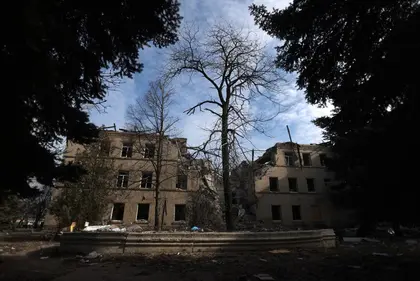Olena Obodets rushed to the hospital in east Ukraine moments after a Russian missile tore into its maternity ward last week, sparking a frantic evacuation of dozens of patients in the dead of night.
Days after the strike in the town of Selydove that killed a 36-year-old pregnant woman, a mother and her nine-year-old son, she dabbed her eyes with tissue as she recounted seeing the hospital's caved-in roof and building on fire.
JOIN US ON TELEGRAM
Follow our coverage of the war on the @Kyivpost_official.
"Tears. Nightmare. Fear," she said.
The bombardment was just one horror in a months-long Russian onslaught that saw Vladimir Putin's forces last week capture the nearby battered industrial hub of Avdiivka, 30 kilometres (20 miles) to the east.
Apart from handing Moscow its first significant victory in nearly a year, the advances have renewed an agonising choice for Ukrainians in places like Selydove that could be next: flee now, or hope their struggling army can save them.
"I'm hearing a lot of people in the town talking about whether they're going to evacuate or not," the 42-year-old told AFP, the acrid smell of charred concrete hanging in the winter air, mixing with dull thuds of distant artillery.
"People are afraid. My daughter asks me every day -- every day -- to evacuate, but I tell her the time hasn't yet come," said Obedets, who has worked at the hospital for eight years.
- Evacuate the dead -
As the fighting draws nearer, the police force -- including officers forced to flee towns earlier captured by Russia -- face the daunting task of evacuating civilians from increasingly dangerous territory.

Drone Wars –Technology, Tactics, Strategy, Countermeasures, Legislation
Oleksandra Gavrylko, 31, the region's police spokeswoman, said the fresh strikes and Russian advances had spurred an uptick of evacuations from civilian hubs like Selydove, declining to give figures.
But the critical moment to leave Avidiivka and its surrounding hamlets was already a year ago, she said -- a grim truth their work over recent weeks had underscored.
"More often now we evacuate killed civilians," she told AFP in a basement police station in the region.
"We transport the bodies of dead civilians so that their relatives can bury them."
Next to a Soviet-era World War II memorial in Selydove, a trickle of people were returning to smouldering homes -- hit an hour before the hospital -- to salvage belongings.
A panicked mother hauling bags of belongings from her damaged flat said she would remain. Her daughter told AFP that she wanted to leave.
Nearby, state prosecutor Olena Osadcha, 40, who had earlier fled from the Russian-occupied city of Donetsk, said authorities had given her the option of keeping her job in the city of Dnipro further west.
- 'It's not safe' -
"Yeah, we'll be leaving. We just haven't found a place yet. Of course, I don't want to go to Dnipro. It's not safe there either," she said.
A sushi restaurant re-opened in Selydove this month, pointing to the determination of some residents to remain however bad it gets.
The 46-year-old director of the ruined hospital, Oleg Kiyashko, said that after the latest strikes, nearly two-dozen staff of the 350 that had remained until now announced they were leaving for safety.
AFP saw staff carrying shopping bags of usable medical supplies from the hospital, stepping over shattered glass and strips of bent metal, while municipal workers boarded shattered windows.
"We're all thinking about where it would be better. But if the situation requires us to be here today, then we are here. I'm not going anywhere for now," Kiyashko said during an interview, interrupted by the thump of a close strike.
Several kilometres from Avdiivka, near the village of Progres, Ukrainian troops were digging fresh defensive lines that Russian forces will now be tasked with breaking through.
Columns of armoured vehicles had sped past the village hours earlier.
The last shop in the village, located on Victory Street, was selling off stock and preparing to close, hours after its windows were blown out by shelling.
- 'There will be no one here' -
Tearful staff and its owner were mulling if they would re-open at all, given the uptick in shelling and steady exit of shoppers -- some of whom had previously fled Avdiivka.
"When it gets really bad, you know, there will be no people here. No one will buy food," shop owner Dmytro Dymytrov, 40, said.
Outside, 66-year-old pensioner Viktor was packing his bicycle with as many bottles of fresh water as it could hold.
He was nonchalant about the thuds of artillery nearby but conceded they were getting more frequent -- and louder.
"My neighbours went to Dnipro," he explained, over rounds of incoming and outgoing artillery fire, "but I've got nowhere to go".
Gavrylko, the police spokeswomen, said the elderly -- like Viktor -- were the hardest to persuade to leave.
"They want to die on their own land".
You can also highlight the text and press Ctrl + Enter






